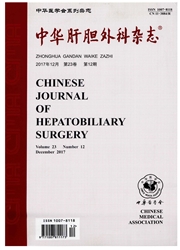

 中文摘要:
中文摘要:
目的研究siRNA对肝癌耐药细胞系HepG2/mrp1中多药耐药相关蛋白基因(multi—drug-resistant-associated1,mrp1)及其蛋白产物MRP1表达的抑制作用和逆转其耐药性的效果。方法设计合成针对mrp1启动子区域的RNA干扰小片段,转染肝癌耐药细胞HepG2/mrp1。通过RT-PCR和流式细胞仪,在mRNA和蛋白质水平评估RNA干扰对mrp1表达的影响;MTT法检测RNA干扰逆转HepG2/mrp1细胞多药耐药性的变化,按照实验组和亲本组细胞的半数抑制剂量(IC30)评估RNA干扰对细胞耐药倍数的改变。结果在耐药细胞HepG2/mrp1中,RNA干扰明显抑制了mrp1mRNA和蛋白产物MRP1的表达水平,在相同浓度药物作用下实验组细胞耐药性显著下降。结论我们设计的siRNA对肝癌耐药细胞HepG2/mrp1中的mrp1基因有显著的抑制作用,具有良好的逆转多药耐药性的效果。
 英文摘要:
英文摘要:
Objective To investigate the suppression of mrpl and MRP1 induced by small interfering RNA and the restoration of sensitivity to chemotherapeutic drugs in the multidrug-resistant hepatocellular carcinoma cell lines HepG2/mrp1. Methods mrp1-targeted small interfering RNA duplexes were designed and composed and introduced into multidrug-resistant hepatocellular carcinoma cell lines HepG2/mrp1. The suppression of mrpl mRNA and its gene product MRP1 was examined by RT-PCR and flow cytometry (FCM), respectively. MTT assay was performed to measure the reverse effect of small interfering RNA based on the results of IC50. Results The overexpression of mrpl mRNA and MRP1 was effectively suppressed by small interfering RNAs. The level of mrp1 mRNA in the transfected HepG2/mrpl cells was reduced to (86.36±2.76)% and MRP1 to (89.38±3.76)% compared with those of the controls. The resistance to ADR was reversed five-fold, which indicated the restoration of sensitivity to drugs. Conclusion Small interfering RNA can inhibit mrpl expression effectively and reverse the multidrug resistance mediated by MRP1.
 同期刊论文项目
同期刊论文项目
 同项目期刊论文
同项目期刊论文
 期刊信息
期刊信息
